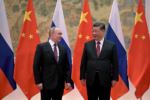Canada Strengthens University Research Security, Impacting Relations with China

Image Source: Council on Foreign Relation
The Canadian government unveiled a new security system for university research with the goal of preventing tech secrets from leaking to significant Chinese, Russian, or Iranian research organizations as geopolitical tensions rise.
Federal Canadian funding for “sensitive” research projects connected to any of the 103 foreign colleges and institutes that the government claims “could pose a risk to Canada’s national security” would be prohibited under the new policy, which is the most comprehensive security procedure yet made public in the West. Future applications for federal research funding that fall under the policy’s purview will need applicants to sign an “attestation” attesting to their compliance. To confirm this, “random” audits will be carried out by the nation’s security agencies.
In a press briefing on January 16, a Canadian official stated that while the regulations may, in theory, apply to “tens of thousands” of grant applications, in actuality, they would only have an impact on a far smaller number of research programs. A more accurate approximation was not provided.
Although the government originally hinted at its intentions for the program in February 2023, many academics were caught off guard by the details that were revealed this week. There is a long list of “sensitive” technology. Universities Canada’s CEO and acting president, Philip Landon, remarked, “It’s almost everything under the sun.” However, as colleges have been progressively stepping up security over the previous six years, “we don’t suspect it will have a huge impact, But the impact won’t be zero, either. I think it’s still too early to tell.”
Each university will have a different impact. Ian Milligan, an assistant vice president of the University of Waterloo, one of Canada’s top IT colleges, stated that “the scope [of the rules] is significant.” “It will affect many of our researchers.” Just a few hours after the government’s statement on January 16, he claimed, the institution sent a letter about it to the faculty and now has “several people working full-time” on comprehending and informing scholars about it.
Uncertainty of the impact on Horizon
The regulations’ impact on Canadian partnerships with other associated organizations, particularly the fact that Canadians are beginning to apply for financing via the EU’s Horizon Europe initiative, is also not entirely clear.
A few organizations that Canada has placed on its blacklist are involved in Horizon projects. One of the so-called “Seven Sons of National Defense” connected to China’s military is Beihang University. Although there are presently no Canadians working on those projects, unless the EU adopts similar regulations, the scenario may provide some challenging legal challenges for any future EU projects that Canadians may participate in.
The governments of the US, UK, Australia, Japan, and other allies are also strengthening security regulations at the moment, as is the case with the EU. The public feedback period on new security procedures that Brussels officials are examining has recently ended. It has already withdrawn all Russian grant recipients, released an online “toolkit” for research security, and drastically reduced the range of subjects on which it will finance European research partnerships with China.
Republicans and Democrats alike are accusing China of stealing American technology, which is adding to the security anxiety in Washington. Working with funders from Canada, the UK, and other allies, the US National Science Foundation is creating a new hub for security information for American colleges.
Furthermore, this month saw the release of a report by the Government Accountability Office criticizing the methods used by US government science funders to monitor potential security risks. The report noted that various security risks are listed differently in each agency’s public databases, making it more difficult for universities receiving funding from multiple sources to confirm they are safe.
Team Profile

- News Writer
- Ishaan Shahabadi is an individual driven by a diligent passion for international affairs, politics, reading, and writing. With a comprehensive understanding of these subjects, he possesses the expertise to add significant value and seamlessly integrate into the proposed process. Ishaan is committed to prioritizing assigned tasks, meeting deadlines, and ensuring optimal performance, showcasing a robust work ethic. His dedication and proficiency make him a valuable asset, ready to contribute meaningfully to any project or initiative he undertakes.
Latest entries
 English18 January 2024Canada Strengthens University Research Security, Impacting Relations with China
English18 January 2024Canada Strengthens University Research Security, Impacting Relations with China English16 January 2024A.S. Roma Sacks José Mourinho After Poor Run; Daniele De Rossi Named Interim Coach
English16 January 2024A.S. Roma Sacks José Mourinho After Poor Run; Daniele De Rossi Named Interim Coach English14 January 2024HOUTHI AND THE RED SEA
English14 January 2024HOUTHI AND THE RED SEA English11 January 2024Emirates FA Cup Round 3 Match Review – Wigan Athletic vs Manchester United: A Job Done (Well?)
English11 January 2024Emirates FA Cup Round 3 Match Review – Wigan Athletic vs Manchester United: A Job Done (Well?)









